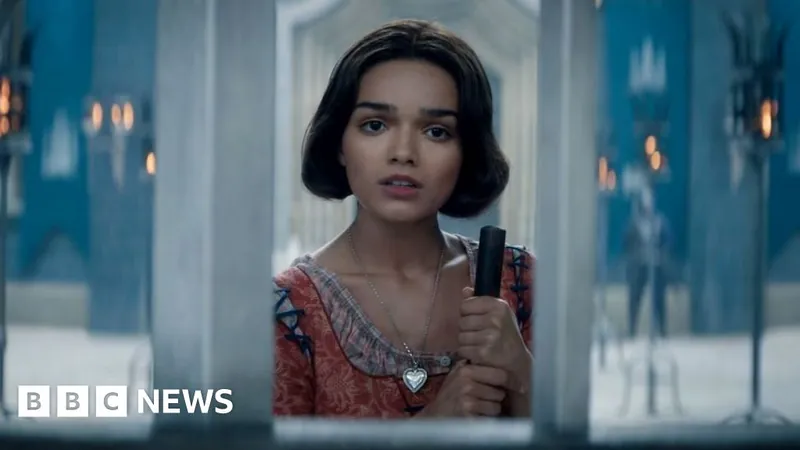
The Fierce Controversy Surrounding Snow White and Rachel Zegler: A Tale of Backlash and Resilience
2025-03-30
Author: Wei
In a cinematic landscape rife with reboots and remakes, Disney’s latest live-action adaptation of Snow White has ignited a fiery debate, largely centered around its lead actress, Rachel Zegler. The 23-year-old star has been at the heart of polarized discussions, with some blaming her for the film's lukewarm reviews while others argue she is an unfair target in a culture war.
A Storm Before the Release
As the film hit theaters earlier this month, it received mixed reviews. While it secured the top spot at the North American box office, its earnings fell short of projections, leading to calls for accountability directed squarely at Zegler. Notably, Jonah Platt, the son of the film’s producer, publicly lambasted her on social media for allegedly intertwining her personal politics with the film's promotional efforts. This incendiary post was deleted but not before it made headlines, reinforcing the notion that Zegler's voice carries significant weight in the film's narrative.
In the lead-up to the film's release, Zegler was heavily criticized for challenging the conventions of the original animated classic. In a bold statement, she questioned the portrayal of Snow White's romance, deeming it “weird” that a character was likened to a stalker. Her critique extended to the original's themes of female empowerment, leading to accusations of being overly politically correct—criticism she willingly embraced. “Yes, it is a PC Snow White because it needed that,” she remarked, a stance that ignited further discussion regarding the evolving portrayal of female characters in media.
A Culture War Casualty
Film critics, including Kelechi Ehenulo, argue that Zegler's story is emblematic of how actors from underrepresented backgrounds face backlash for merely speaking out. Engaging in political discourse comes with its challenges, particularly for Zegler, who identifies as Latina. Her comments, such as a supportive nod to the Palestinian cause and her thoughts on former President Trump, have polarized audiences, prompting her to walk back some of her views amid rising tensions.
This environment is particularly toxic, given the film's confluence of Hollywood’s creative doldrums, racial politics, and America’s increasing ideological divides. Conor Riley noted that Zegler became a "lightning rod" for controversy, making it difficult for audiences to separate their animosity towards her from the film itself.
Many agree that criticism toward her is fraught with bias; as a young Latina woman, Zegler finds herself subjected to a different level of scrutiny compared to her male counterparts. Anna Smith highlighted the disproportionate backlash aimed at women in the public eye, pointing out that female criticisms often come wrapped in underlying prejudice.
The Future Looks Bright
Despite the controversy, Zegler's career is not in jeopardy. She is slated to star in a new adaptation of Evita in London’s West End, and her recent involvement in reading a children’s bedtime story on CBeebies showcased her versatility and ability to connect with younger audiences. In her closing words, Zegler encouraged viewers to recognize their own power, saying, “To be a powerful princess, you just need to be wonderful, brilliant you!”
As discussions continue, the question remains: How might this resonate with future projects in Hollywood? With Zegler's unique voice carving a niche in the entertainment industry, her journey offers both cautionary tales and inspiring narratives for young actresses navigating the treacherous waters of fame and public opinion. While the debate around Snow White rages on, Zegler stands resilient, ready to face whatever comes next in her path—an embodiment of both the struggles and triumphs of a new generation of storytellers.



 Brasil (PT)
Brasil (PT)
 Canada (EN)
Canada (EN)
 Chile (ES)
Chile (ES)
 Česko (CS)
Česko (CS)
 대한민국 (KO)
대한민국 (KO)
 España (ES)
España (ES)
 France (FR)
France (FR)
 Hong Kong (EN)
Hong Kong (EN)
 Italia (IT)
Italia (IT)
 日本 (JA)
日本 (JA)
 Magyarország (HU)
Magyarország (HU)
 Norge (NO)
Norge (NO)
 Polska (PL)
Polska (PL)
 Schweiz (DE)
Schweiz (DE)
 Singapore (EN)
Singapore (EN)
 Sverige (SV)
Sverige (SV)
 Suomi (FI)
Suomi (FI)
 Türkiye (TR)
Türkiye (TR)
 الإمارات العربية المتحدة (AR)
الإمارات العربية المتحدة (AR)